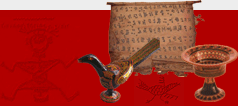|
凉山彝族灵魂观:仪式与文献的文化阐释
The Nuosus’ Conception of Soul: A Cultural Interpretation
of Rituals and Scriptures
摩瑟磁火 Mose Cihuo
凉山州民族语言文字工作委员会
【摘要】在我们用汉语“灵魂”一词来描述彝语“依娜””一词所包涵的文化内涵时,由于语境不同,我们会遭遇到表述上的诸多困惑。正是这种困惑的存在,或学者们有意无意的疏忽,使目前我们关于“依娜”的描述仍存在一些问题。“依娜”一词的语义还需要得到进一步的追溯和阐释。本文首先就此问题作一些力所能及的探讨,以期获得关于此概念的较为清晰的认识和理解。而在这个过程中,自然就会涉及到彝族民间信仰中关于“依娜”的丰富多彩的看法和相关的故事,也会涉及到毕摩文献和毕摩仪式中与“依娜”有关的部分,对于这一部分,本文会进行重点的介绍和分析,并在此基础上提出一些个人的看法。接下来本文将探讨与“依娜”密切相关的“尼此”(鬼)、“色”(主)、“阿散”(护法神)、“阿普阿玛”(祖灵)等词汇中所包涵的各种观念。弄清这些词语的涵义,并梳理出它们背后所包含的各种观念之间的复杂关系,是我们全面了解彝族宗教系统的重要步骤。对此,本文也会试着从理论上做一些更为宽泛的讨论。
Abstract
When we use the Han term linghun (roughly, English “souls”)
to describe the cultural content of the concept of yyrna
in Nuosu language, because of the very different linguistic
environments we can run into lots of frustration. Because
of this frustration or perhaps because of the intentional
or unintentional carelessness of certain scholars, several
questions still remain in our current descriptions concerning
yyrna. The meaning of yyrna still needs more investigation
and clarification. This essay first discusses what we can
know about this concept, in order to give us a somewhat
clearer recognition and understanding of it. And in the
process of this discussion, we will naturally touch upon
some of the rich and varied perspectives and stories about
this concept found in Yi popular religion, as well as touching
on those sections of Bimo documents that deal with yyrna.
This essay will concentrate on introducing and analyzing
these sections, and at the same time on the basis of these
propose some of my own individual opinions on these issues.
After this, the essay will discuss the concepts embodied
in vocabulary that is closely related to yyrna, including
nyitcy (“ghosts”) sip (host), asa (guardian spirit), and
apu amat (ancestral spirits). Clarifying the meaning of
these concepts, as well as picking out the covert complex
relationships between them, is an important step in our
comprehensive understanding of Yi religion. Toward this
end, the present essay will also attempt to discuss these
issues from a broader theoretical perspective.
作者简介:
摩瑟磁火,男,彝族,1990年毕业于中央民族大学。毕业后到美姑县语委工作,2000年11月到凉山州语委。从事彝族文化的基础研究和彝文古籍的收集、整理、翻译、研究工作。1995─1996年间参加“(日中联合)西南中国民俗考察团”,参与了该团在美姑期间的田野调查工作,并应邀赴日本进行学术考察。作为美姑彝族毕摩文化研究中心的发起人和具体组建者之一,曾任该中心的秘书长,并在此期间主编《美姑彝族毕摩文化调查研究》两期。有《凉山彝族驱鬼经》、《赎魂经》、《勒俄特依》等译著在台湾、日本出版。所著《美姑地区毕摩宗教活动简介》被翻译成日文出版。到州语委以来,主要负责编写国家民委的跨世纪文化工程《中国少数民族古籍总目提要?四川彝族卷》,还参与编撰中央民族大学哲学系211工程项目《中国少数民族原始宗教经籍汇编?彝族卷》。先后发表彝学研究方面的论文10余篇。
About the Author
Mose Cihuo (Hmosi Cyho) graduated from the Central University
for Nationalities in 1990. After graduation, he went in
for work in Ethnic Language Committee of Meigu County, and
moved to Language Committee of Liangshan Prefecture in 2000.
He conducts basic research on Yi culture, as well as participates
in collection, collation, translation, and research on traditional
Yi documents. In 1996, he took part in the Sino-Japanese
Joint Project for Ethnic Folklore of Southwest China, participating
in group’s fieldwork carried out in Meigu and in Japan.
As one of the founders and active workers in Meigu Bimo
Culture Research Center, he has been the secretary-general
of that institute, and during that time was the chief editor
of two issues of Investigation and Research into the Bimo
Culture of Meigu. His translations of A Liangshan Yi Scripture
for Exorcising Ghosts (jointly translated) and A Scripture
for Buying Souls, as well as the classic Hnewo Tepyy have
been published in Taiwan and Japan. His Brief Introduction
to Bimo Religious Activity in the Meigu Area has been translated
and published in Japanese. Since moving to the Prefectural
Language Committee, he has been chiefly engaged in writing
and editing a New Century Project of the State Nationalities
Commission, the Sichuan Yi volume of A General Annotated
Bibliography of Traditional Documents of China’s Minorities,
as well as participating in the editing of the Yi volume
of Collected Documents Relating to the Primitive Religions
of China’s Minorities, a “211” project of the Philosophy
Department of Central Nationalities University. He has published
over 10 articles relating to Yi Studies.
|





